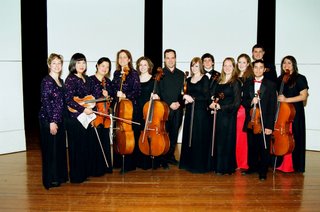* * *
But I'm here, with a start on a report on my trip(s) last weekend. I felt like I was visiting three different countries -- Midland-Odessa, Houston and Los Angeles -- in the space of sixty hours. I know, they are all part of the good old USA, but aside from a common language and the same airport television stations, they couldn’t have been more different.
But one nice thing they had in common was gaggles of young people learning to play very complicated and old instruments – at least old in design, and sometimes old in construction.
Midland-Odessa was my first stop, for the second annual
Cassatt in the Basin project. For those of you who haven’t read my blog in the past nine months (or have too many other more important things to keep track of to remember my digital scribbles), the Cassatt Quartet commissioned a triple quartet from me for this residency, to premiere with two local high school quartets. The kids got the music a few months ago; Cassatt arrived a week before the performance. In addition to preparing my
Blossom, the quartet also sat next to the principals in the student chamber orchestra, coached chamber music groups, and generally provided musical guidance of the highest caliber.
Midland-Odessa is in the oil-rich western part of Texas, with fabulous wealth disguising serious isolation. The two cities, each with populations in the 100,000 range, struggle with some of the same problems one finds all over, most seriously teen pregnancy. Cassatt has used this residency to establish positive role models. By engaging the kids in chamber music, they are fostering teamwork and discipline, but unlike in sports, the teamwork and discipline of chamber music is in the service of beauty. For my part, it felt great to have my music serve an important social purpose – not something music
has to do in order to be significant, but one of the many things it
can do to great effect.
I arrived at the Midland-Odessa airport the day before the premiere. My hosts were Dr. and Dr. Topal, an opthamologist and a gynecologist in their 60s. They took nice care of me, serving wonderful vegetarian samosas and tasty Indian tea. I came to admire Kamal Topal in particular: a diminutive, energetic and chatty woman, she runs the Odessa Planned Parenthood branch, which is a bit like running a tax collection agency on Wall Street. I’d say she earned a lot of respect from me, except I don’t think she needed to earn anything from me, seeing as how my house would fit pretty comfortably in her living room.
We rehearsed my triple quartet that evening, making substantial progress in an hour. Rehearsal was followed by two dinners -- one Caribbean and one Japanese – these are the kinds of hosts who wouldn’t settle for preparing just one dinner for their guests. The woman who made the Japanese food kept assuring me I wouldn’t like it, as I feasted on sushi, miso soup and more. She should see the globe-hopping that happens every week in my kitchen.
I’m always wary of people who jump to clichéd assumptions when they are away from home, grasping at the slightest clues to support their prejudices. But I must admit, I did a double-take as I arrived at Bonham Jr. High for the performance on the following day and was greeted by a large sign saying “If You Don’t Believe, You Don’t Belong.” It took me a moment to realize the slogan was in reference to the school football team, but it still struck me as a painfully loaded message to send to teenagers.
But I live in my world, and everyone else is welcome to live in theirs.
The music covered a lot of bases, but one piece that stuck in my head was a Beethoven string trio arranged for cello and two double basses. No disrespect to the performers, who acquitted themselves admirably, or to the double bass, which is an instrument I fell in love with early and hard, but it’s easy to imagine this would be a perfect nightmare for a cellist –
I’m about to go out onstage to play a Beethoven trio, but instead of violin and viola, I’m playing it with two double basses…and I forgot to put my clothes on this morning.My piece got a big buildup. It was last on the program, and it was preceded by a speech about how exciting it is to premiere a new work, especially a work of such magnificence, etc., etc. (No, I wasn’t the one doing the talking.) Then the musicians came out on stage. Applause. They take their seats, arrange their music on the stands, adjust themselves in preparation for the performance.
After about 30 seconds of this, a child’s voice calls out from the back of the auditorium: “OKAYYYYYY, We’re REA-DYYYYYY!”
Best intro I’ve ever had.
 post-performance line-up for paparazzi
post-performance line-up for paparazzi



